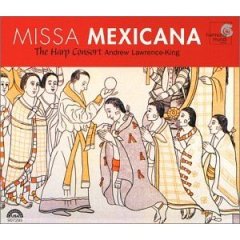Missa Mexicana – The Harp Consort (2002)
Missa Mexicana – The Harp Consort (2002)

1. Villancico: Canten Dos Jilguerillos / Francisco Escalada
2. Kirie [Missa Ego Flos Campi] / Juan Gutiérrez De Padilla
3. Jácaras De La Costa / Santiago De Murcia
4. Xácara Los Que Fueren De Buen Gusto / Francisco De Vidales
5. Gloria [Missa Ego Flos Campi] / Andrew Lawrence King play
6. Corrente Italiana / Juan Cabanilles play
7. Xácara: A La Xácara Xacarilla / Juan Gutiérrez De Padilla
8. Credo [Missa Ego Flos Campi] / Andrew Lawrence King
9. Cumbées / Santiago De Murcia
10. Negrilla A Siolo Flasiquiyo / Andrew Lawrence King
11. Sanctus [Missa Ego Flos Campi] / Andrew Lawrence King
12. Marizápalos A Lo Humano: Marizápalos Bajó Una Tarde / Anonympus, 17th-C. Peru
13. Marizápalos A Lo Divino: Serafín Que Con Dulce Harmonía / Joan Cererols
14. Diferencias Sobre Marizápalos / Miguel Pérez De Zavala
15. Agnus Dei [Missa Ego Flos Campi] / Andrew Lawrence King
16. Guaracha Convidando Está La Noche / Juan García De Zéspedes
The Harp Consort
dir. Andrew Lawrence-King (Spanish harp, organ, psaltery)
Ellen Hargis, Tuuli Lindeberg, Clara Sanabras (sopranos)
Jennie Cassidy, Veera Railio (altos)
Julian Podger, Ian Honeyman (tenors)
Paul Hillier, Paul Willenbrock (basses)
Steven Player, Lee Santana, Julian Podger, Clara Sanabras (Mexican baroque guitars)
Thomas Ihlenfeldt (Mexican guitar, theorbo)
Hille Perl (gamba, lirone, Mexican guitar)
David Yacus (sackbut)
Keith McGowan (bajón, shawms)
Adrian Rovatkay (bajón)
Michael Metzler (conch shell, percussion)
Ricardo Padilla (percussion)
Helen Coombs (organ, percussion)
"New Spain" comes roaring to life on Missa Mexicana. The disc's mainstay is a Mass setting by Juan Gutiiérez de Padilla, who was appointed maestro de capella at Mexico's Puebla Cathedral in 1629. Although Padilla was born in Andalucía, his work came to embrace Mexico: the rhythms of its dances, the exuberance of its song, and the textures of its popular instrumental ensembles (complete with guitars, percussion, and shawms). Padilla was not a pioneer in this regard; at the time, Spain's sacred music was also greatly influenced by secular sounds. But perhaps the greatest draw of this repertoire, as Andrew Lawrence-King shows off so well, is the tight interweaving of European, Native, and African cultures in Padilla's Mexico, and how he and his contemporaries utilized all of these cultural streams in their own work. Bolstered by an array of other compositions of the age, Lawrence-King makes a strong case for 17th-century Mexico as a cultural crossroads, not merely as a remote outpost of Spanish influence. One prime example is Santiago de Murcia's "Cumbées," with its call-and-response vocals, delicate, mbira-like instrumental interlude, and earthy drumbeat recalling West African music. Another is Padilla's own Christmastime negrilla, "A siolo flasiquiyo," which invites worshipers to dance the guacambe, canario, and villano to celebrate the Messiah's coming. As on his other recordings, harpist and conductor Andrew Lawrence-King has brought together a host of today's most respected early music specialists for this trip to Mexico, including soprano Ellen Hargis, bass Paul Hillier, and gamba player Hille Perl. Lawrence-King himself performs on the Spanish harp, organ, and psaltery. As one might expect from such a gathering, the ensemble is top notch, in both technical expertise and musicianship. The singers (and instrumentalists) are equally comfortable in both Missa Mexicana's religious and earthly spheres, moving from a Gloria to a bawdy song with ease. --Anastasia Tsioulcas
download: uploaded anonfiles yandex 4shared solidfiles zalivalka mega filecloudio
Last Updated (Tuesday, 15 October 2013 09:04)








